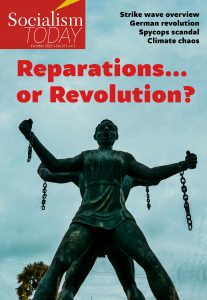
The Black Lives Matter movement has reignited an ongoing discussion about whether or how reparations should be made for the horrors of slavery. To coincide with Black History Month we are publishing the following article by PAULA MITCHELL as a contribution towards that debate.
Karl Marx famously said that capitalism came into being “dripping from head to toe, from every pore, with blood and dirt”.
By this he meant “the discovery of gold and silver in America, the extirpation, enslavement and entombment in mines of the indigenous population of that continent, the beginnings of the conquest and plunder of India, and the conversion of Africa into a preserve for the commercial hunting of black skins, are all things which characterise the dawn of the era of capitalist production. These idyllic proceedings are the chief moments of primitive accumulation…”.
From the fifteenth to the nineteenth centuries, estimates vary but between ten and fifteen million Africans were kidnapped and crammed into merchant ships, to be enslaved in the Caribbean and southern states of America. The trade was begun by the Portuguese but by the seventeenth century Britain was at the heart of it. An estimated two million perished on the Middle Passage, dying in horrific conditions or thrown overboard. On arrival they were sold and sold again as commodities; families divided, and put to work on plantations; branded, raped, lynched and mutilated. The trade in slaves and in the commodities produced on the plantations was one of the key elements in the genesis of capitalism, and in particular enabled the growth of Britain as the world’s foremost capitalist economic power.
Read more